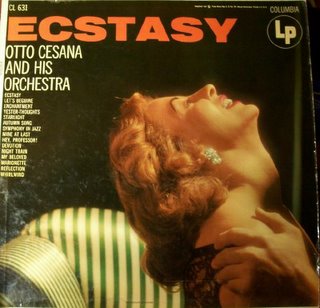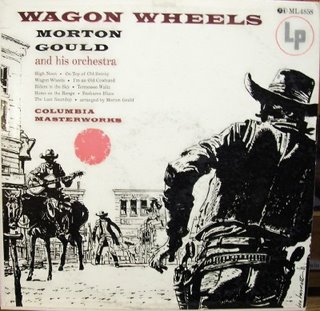Lounge music, that is. I can't speak for the furniture of the period. That I don't know about.
Um.... Er....
Oh, no--sirens. The Lame Introduction Police are coming! I'd better get these up fast.
We have four 1953 gems to share today, including one I really went all out to secure a decent copy of. I refer to Morton Gould's recording of Reginald King's
Theme from Runnymede Rhapsody, a.k.a.
Where Water Lilies Dream (I kind of prefer
Theme from...). I first heard it on a pop-infested thrifted single and decided I had to get my paws on a better copy. Soon after, I won it from eBay on a 10" LP which turned out to be groove-damaged beyond hope--someone must have tried to play the thing on a gramophone. (The dealer was cool, though--I never received a prompter refund.) Then I got another copy of the 45 (eBay, again), which looked great but sounded like crap, owing either to play with a bad needle or simply too much wear. A lesser collector would have given up, but not me--I went for the next copy that showed up on eBay. Which turned out to be fine. And this is the copy we're about to enjoy.
In all, this only cost me five thousand dollars:
Runnymede Rhapsody (Reginald King), Morton Gould at the Piano and conducting the Rochester "Pops," 1953. From Columbia 45.
Runnymede Rhapsody was composed in 1947, and it might be my favorite condensed concerto of all (to use a term I made up). That's what I call stuff like this. Masterfully done. And masterfully declicked by me--the really quiet piano part at the end had five or six loud digs. Smaller than anything, but
loud. It's amazing how hard you have to squint sometimes to see something that sounds like BOOM! when the stylus crosses it. Hence, we vinyl collectors
love symphonic-type music pressed on crammed-together grooves. I know I do.
This next mood masterpiece could use greater dynamic range--and my 78 copy had plenty. But I don't have
it any more. I got this to sound pretty good, though, with some careful and clever lower-end boosting (talk about testing the line between mud and boomier bass):
Ebb Tide (Robert Maxwell), Frank Chacksfield and His Orchestra, 1953. From London 45.
Damn, that's a great side! Unlike Chackfield's stereo remake, which I can live without. I can also live without the song versions of this, as the thing is moody enough without the hokey lyrics and over-arrangements that got tacked on to Maxwell's contrived but clever tune. Whatever I just typed.
The flip, Ray Martin's delightful
Waltzing Bugle Boy, isn't sonically pinched at all. Almost the reverse:
Waltzing Bugle Boy (Martin), Frank Chacksfield and His Orchestra, 1953. Flip of
Ebb Tide.
Dumb title, killer piece--
Waltzing Bugle Boy. Heard it for the first time when I made this file.
And we close with an unbelievably moody version of Charles Chaplin's
Terry Theme, one that sounds more like Sixties easy listening than something pre-Elvis. As I have suggested before, Hugo Winterhalter was on the easy cutting edge. He really and truly was:
The Terry Theme (Chaplin), Hugo Winterhalter and His Orchestra, 1953. From RCA Victor 45.
I walk away from this post with that good feeling that only comes with having presented some of the very best sides in your record collection. I mean, my record collection.
One's record collection. There, I said it. (Damn, I hate "one's." Give me tens. Twenties, even)
Lee, in bad-word-play mode



